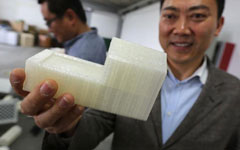 |
|
A clutch of startups are offering services that allow you to scan your keys with a camera, create a 3D model and print off temporary plastic copies.[Photo/Provided to?CHINA DAILY] |
Three startups in the US offer services that allow you to print temporary plastic copies of your keys, but there are security problems as others may also easily replicate them.
Your house keys are a mechanical anachronism in a digital world, but if you lose them you'll still be stuck outside in the rain.
Now a clutch of startups are offering services that allow you to scan your keys with a camera, create a 3-D model and print off temporary plastic copies at the click of a button. The idea is to replace expensive locksmith call-outs with cloud storage and ubiquitous 3-D printers.
Right now there are three main players: US firms Keys Duplicated and KeyMe, and Belgium-based Keysave. None of these services are currently available in the UK.
|
 |
|
 |
Right now, your "local 3-D print shop" may be non-existent, or certainly not so "local", but that will change. The cost and quality of printers are plummeting and soaring, respectively. Eventually it could just be a case of popping next door to borrow your neighbour's printer for five minutes.
Keys Duplicated and KeyMe both work on a slightly different premise. Smartphone apps allow you to scan your keys yourself and then order permanent metal replacements through the post. Keys Duplicated charges just $6 and plans to introduce some types of car keys as well as the existing Yale door keys to its offerings soon.
But this brings us to some rather large and worrisome security problems. Some of these apps require only a smartphone app to scan a set of keys and order duplicates. How often do you leave your house keys unattended long enough for someone to scan them with a camera? Mine are sitting on my desk as I write this, as they do every day (maybe not from now on).
The San Francisco start-up Keys Duplicated claims that keys have always been vulnerable to this sort of attack as they could be imprinted in clay (a trick we've all seen in spy films) or measured with a special key gauge, then duplicated at a key cutting shop. It also says that it's less likely to be used by criminals because of the digital paper trail left by ordering with credit cards. But a smartphone app is undoubtedly easier for the layman than tricky physical copying techniques, and credit card fraud is hardly unprecedented.
Rival KeyMe says that its scanning process "is designed to strictly prevent any use of flyby pictures. Keys can only be scanned when off of the keychain, placed on a white piece of paper, and taken from 4 inches away. Furthermore, we require that users scan both sides of the key."
However, a recent investigation by Wired found that a reporter was able to surreptitiously photograph a neighbour's house key in 30 seconds, while still on a keyring, and have a replacement within an hour via KeyMe.
It seems that, like our credit cards, we should never let our keys out of sight for fear that they could be copied in seconds. More than that, we must keep them out of sight of others, because they can be duplicated from a simple digital photograph. Even leaving your keys on your desk could leave a window of opportunity open for a tech-savvy burglar to snap them, copy them and use them to clear out your home of valuables.
